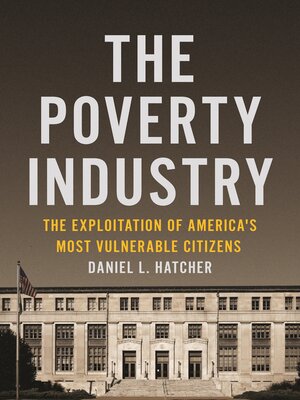The Poverty Industry
ebook ∣ The Exploitation of America's Most Vulnerable Citizens · Families, Law, and Society
By Daniel L. Hatcher

Sign up to save your library
With an OverDrive account, you can save your favorite libraries for at-a-glance information about availability. Find out more about OverDrive accounts.
Find this title in Libby, the library reading app by OverDrive.



Search for a digital library with this title
Title found at these libraries:
| Library Name | Distance |
|---|---|
| Loading... |
The shocking truth about how state governments and their private industry partners are profiting from the social programs meant to support disadvantaged Americans
Government aid doesn't always go where it's supposed to. Foster care agencies team up with companies to take disability and survivor benefits from abused and neglected children. States and their revenue consultants use illusory schemes to siphon Medicaid funds intended for children and the poor into general state coffers. Child support payments for foster children and families on public assistance are converted into government revenue. And the poverty industry keeps expanding, leaving us with nursing homes and juvenile detention centers that sedate residents to reduce costs and maximize profit, local governments buying nursing homes to take the facilities' federal aid while the elderly languish with poor care, and counties hiring companies to mine the poor for additional funds in modern day debtor's prisons.
In The Poverty Industry, Daniel L. Hatcher shows us how state governments and their private industry partners are profiting from the social safety net, turning America's most vulnerable populations into sources of revenue. The poverty industry is stealing billions in federal aid and other funds from impoverished families, abused and neglected children, and the disabled and elderly poor. As policy experts across the political spectrum debate how to best structure government assistance programs, a massive siphoning of the safety net is occurring behind the scenes. In the face of these abuses of power, Hatcher offers a road map for reforms to realign the practices of human service agencies with their intended purpose and to prevent the misuse of public taxpayer dollars.
With more Americans than ever before seeking unemployment benefits, it is essential to remedy the nefarious practices that will impede them from receiving the full government support they are due. The Poverty Industry shows us the path to rectify this systemic inequality to ensure that government aid truly gets to those in need.







